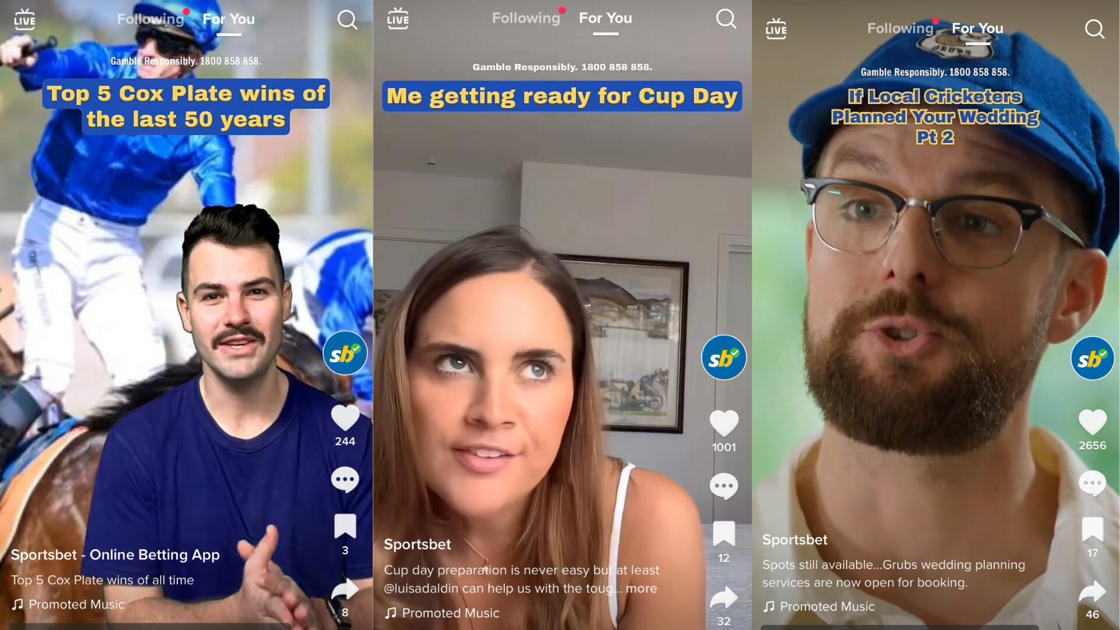
TikTok is allowing betting company Sportsbet to advertise to its Australian users, despite having previously banned betting promotions on its platform.
A TikTok spokesperson said the company was running an Australian-first “strictly controlled advertising pilot” with Sportsbet, a move experts have labelled “concerning”.
TikTok’s Australian advertising policy states “ads promoting fantasy sports, bingo or other gambling-related content”, “ads coming from a gambling brand or featuring gambling branding, and “ads sponsored by gambling brands” are “prohibited”.
But it then says: “A closed pilot for sports betting is currently in operation for one managed client who has obtained permission from TikTok via an application process.”
The platform said the advertisements would be monitored to ensure users had a “safe experience” and contained the “gamble-responsibly messaging” required under law.
Under the “limited trial”, the platform said the ads were shown only to users over 21 years old, although experts said this would be hard to enforce. TikTok also said the frequency of the ads was capped and an “opt-out feature” was being rolled out.
Deakin University gambling researcher Samantha Thomas has condemned the move.
“We know this is a platform that is really appealing and engaging for young people,” Professor Thomas said.
“It’s really concerning for us to start to see these types of posts coming onto the platform.”
The platform, known for its shareable short videos, has an advertising reach of more than 7 million Australians over the age of 18, according to the Digital 2022 Australia report.
And the Australian Gambling Research Centre estimates Australians lost about $25 billion on legal gambling in 2018-19 — the largest per capita loss in the world.
‘Viral video’ advertising
The ABC has found seven video advertisements from Sportsbet posted on the platform within the last month.
Most videos feature young men and women making satirical commentary on attending the races, with two videos specifically mentioning the Sportsbet app.
It is not immediately obvious that the videos are advertisements for gambling, other than the Sportsbet branding and “Gamble Responsibly” tagline.
Professor Thomas said these advertisements posing as “humorous viral videos” made them more appealing and had “a significant impact on the normalisation of gambling for young people”.
“They’re not obviously ads, but they’re still promoting the brand,” she said.
“When we talk to young people about what they remember in terms of gambling ads, the things that they most recall are the funny videos.”
Testing out harmful advertising
University of Queensland digital cultures and societies director Nic Carah said it would be difficult for TikTok to moderate whether the users seeing these ads were over the age of 21.
“The big issue around harmful industries advertising is that many of us sign up to a platform before we’re technically allowed to,” he said.
“So this whole question of platforms gating content for users under a certain age is a little bit messy.”
Research has shown this is true for other social media platforms such as Facebook, Instagram, YouTube and Snapchat, where age-restricted products such as alcohol and gambling have been targeted to people under the age of 18.
Dr Carah said TikTok would be closely monitoring the reaction from users and the public around “harmful” advertising, and predicted there would be more to come.
“I think they’re trying to just figure out what categories of advertising are worth the trouble, so that they make enough money off them, but don’t face too much kind of heat from the public or regulators,” he said.
“And I think they’re going to bring many of these harmful advertisers into the stable to test them out and see if it turns out to be a relationship that benefits Tiktok.”
‘More regulation required’
Both Dr Carah and Professor Thomas agreed the government needed to regulate gambling advertising on social media.
The federal government regulates gambling advertising on tv, radio and online streaming of sporting events but not social media.
“The current regulations around gambling advertising are quite soft at the moment,” Professor Thomas said.
“There are some regulations that are very much focused on television-based advertising, but we know that social media platforms are perhaps most of the media viewing of young people.”
She called on the federal government to enforce “very strong restrictions” on gambling advertising.
Aside from a “total ban”, she said countries overseas had prevented gambling companies sponsoring sporting codes, restricted the timing and placement of these advertisements, and had banned celebrity endorsements of gambling products.
Government ‘very keen’ to discuss further regulation
Federal Minister for Social Services Amanda Rishworth said she was “very keen” to discuss further gambling regulation following the release of results from a parliamentary inquiry into online gambling, which began in September.
Her comments follow the federal government’s announcement gambling companies would be forced to change the language on their advertisements from next year.
“The House of Representatives Standing Committee has started a broad-ranging inquiry into advertising and other areas of problem online wagering,” she said.
“I’m going to wait for the results of that inquiry and work with my state and territory colleagues about what comes next.”
Submissions close this week, but it is not clear when the report will be released.
Sportsbet has been contacted for comment.